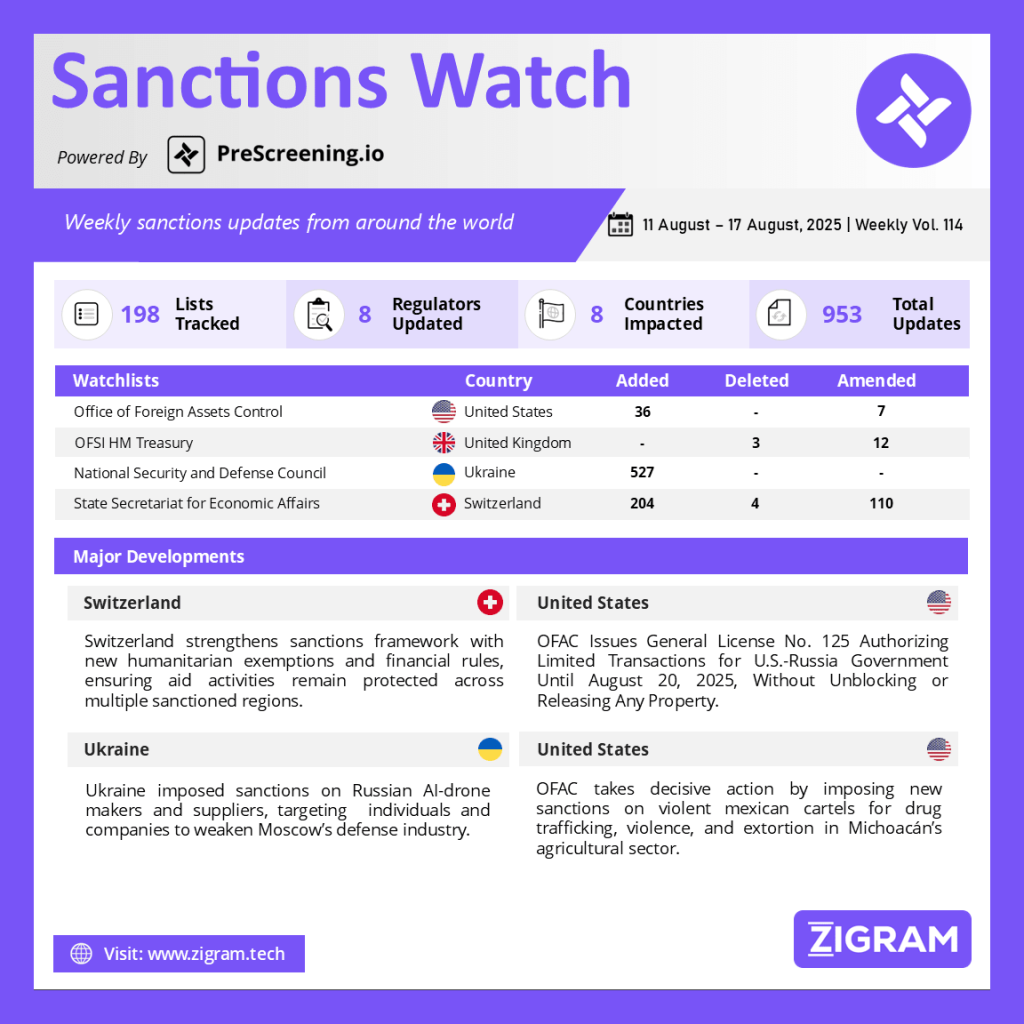Sanctions Watch Vol 114
In the latest edition of our Sanctions Watch weekly digest, we present significant updates on sanction watchlists and regulatory developments.
1. Switzerland Expands Humanitarian Exemptions in Sanctions Framework
The Swiss Federal Council announced amendments to its sanctions ordinances to reinforce humanitarian protections. Effective 15 September, the changes introduce humanitarian exemptions aligned with United Nations (UN) sanctions, while also clarifying and standardising financial regulations.
Although Swiss sanctions have traditionally been designed to avoid hindering humanitarian work, the government recognised the need for greater clarity for aid organisations. The new provisions extend comprehensive exemptions similar to those already applied to UN-based sanctions in 2023, ensuring that humanitarian activities can continue unhindered in sanctioned regions.
The amendments also refine financial measures, including clearer rules for crediting funds to blocked accounts and strengthening reporting obligations. These updates apply to sanctions ordinances related to Belarus, Burundi, Guatemala, Guinea, Guinea-Bissau, Iran, Moldova, Myanmar, Nicaragua, Zimbabwe, Syria, Ukraine, supporters of Hamas and Palestinian Jihad, and Venezuela.
This decision underscores Switzerland’s long-standing humanitarian tradition and its commitment to safeguarding humanitarian action even in complex geopolitical contexts.
2. OFAC Issues Russia-Related General License No. 125 for United States and Russia Government Meetings in Alaska
The U.S. Department of the Treasury’s Office of Foreign Assets Control (OFAC) issued General License No. 125, permitting specific transactions otherwise restricted under the Russian Harmful Foreign Activities Sanctions Regulations (31 CFR part 587) and Ukraine-/Russia-Related Sanctions Regulations (31 CFR part 589). The license authorizes activities that are ordinarily incident and necessary to attend or support meetings in Alaska between the Government of the United States and the Government of the Russian Federation.
The authorization is valid on August 20, 2025. However, it does not allow for the unblocking or release of frozen assets, nor does it extend to activities prohibited under other sanctions programs or executive orders.
This temporary license underscores a limited, practical exception to sanctions to enable high-level diplomatic engagement, while maintaining broader restrictions on Russian-related transactions
3. Ukraine Sanctions Russian AI-Drone Makers, Expands Defence Restrictions
The UK President Volodymyr Zelensky signed Decree No. 599/2025, introducing new sanctions against Russia’s military-industrial complex, with a sharp focus on companies developing drones powered by artificial intelligence. The measures target 39 individuals and 55 companies — including 43 Russian, 10 Chinese, and two Belarusian entities — involved in the design, supply, and support of UAVs. Sanctioned organizations include leading drone developers such as Zala Aero, Smart Birds, and Vostok Design Bureau, as well as electronics suppliers and AI research centers like Neurallab and the Center for Unmanned Systems and Technologies.
Zelensky also signed Decree No. 600/2025, amending rules for the State Register of Sanctions covering vessels and aircraft. Ukraine emphasized that it is working with international partners to synchronize these restrictions globally, aiming to disrupt the supply chains sustaining Russia’s war machine. This move follows earlier decrees in July targeting foreign individuals and companies aiding Russia’s aggression, highlighting Kyiv’s intensified efforts to undermine Moscow’s technological and industrial capabilities.
4. OFAC Implements New Sanctions Against Mexican Drug Cartels Tied to Violence and Agricultural Extortion
The U.S. Department of the Treasury’s Office of Foreign Assets Control (OFAC) imposed sanctions on two of Mexico’s most violent criminal groups—Carteles Unidos (United Cartels) and Los Viagras—along with seven of their key leaders. These cartels have been directly responsible for widespread bloodshed in Michoacán, Mexico, and for trafficking synthetic opioids, methamphetamine, and cocaine into the United States.
The designations, taken under E.O. 14059 and E.O. 13224, target the cartels’ leadership structures and revenue streams, including extortion of avocado and citrus growers, cattle ranchers, and municipalities. Carteles Unidos, led by Juan José Farias Álvarez (“El Abuelo”), has been linked to drug production, murders, recruitment of foreign mercenaries, and the use of improvised explosive devices against Mexican forces. Los Viagras, led by Nicolás Sierra Santana (“El Gordo”), has engaged in extortion, kidnappings, and violent assaults, while recently allying with CJNG, a major fentanyl supplier to the U.S.
As a result of these sanctions, all property and interests in property of the designated entities and individuals under U.S. jurisdiction are frozen, and U.S. persons are prohibited from conducting transactions with them. This action underscores Washington’s commitment to dismantling cartel operations fueling violence and narcotics trafficking.
Know more about the product: PreScreening.io
Click here to book a free demo.
Sanctions Watch is a weekly recap of events and news related to sanctions around the world.
- #FinancialSanctions
- #OFAC
- #DroneSanctions
- #SanctionsTracking
- #GlobalSecurityData
- #IranTrade
- #CartelData
- #DataCompliance
- #SanctionsAnalytics
- #DefenseData
- #SanctionsRisk
- #PolicyData

